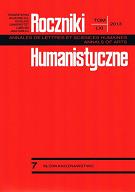Польская Католическая Церковь в политических планах Александра I
Catholic Church in the Kingdom of Poland in the Political Plans of Alexander I
Author(s): Hanna Kowalska-StusSubject(s): History
Published by: Towarzystwo Naukowe KUL & Katolicki Uniwersytet Lubelski Jana Pawła II
Keywords: Catholic Church; Kingdom of Poland; Alexander I; the ideal of a Christian state
Summary/Abstract: The history of the Catholic Church in Poland under the reign of Alexander I corresponded directly to the history of Poland at that time. The Tsar initiated building a new political order in Europe in the post-Napoleon period. This new order was to rest on Christian values safeguarded by the monarchies. Liberal historiography distorted the image of the Tsar, as it failed to recognize his reference to the Byzantine ideals in his plans. The early 19th century was characterised with a subtle atmosphere of crossdenominational spirituality, which relied on spiritual fraternity of nations. It was in stern contrast to the prevalent idea that the state is strictly dependent on the norms of civilization development, which are entirely subservient to the principles of rationalism. Paradoxically, the ideas of eschatological mysticism and striving to build a modern empire merged in the mentality of Alexander I. The principles of Christian universalism helped him reinterpret the ideal of a Christian empire, a new Rome. When referring to the contemporary ideal of the European Union by Robert Schuman, who did anchor it in its Christian roots, one has to remember the pioneering effort by Alexander I. At the same time, it is questionable if the Poles of the time did comprehend his ideas correctly. This miscomprehension is borne out by the fact that the Constitutional Commission composed a Constitution for the Kingdom of Poland which was more liberal than the Constitution of the Duchy of Warsaw. The articles of the former constitution reveal that its authors attempted to marginalize the role of the Church and to grant privileges to secular institutions and ideologies – which was against the Tsar's intentions. Although the Tsar attempted to put into practice the ideal of a cross-denominational Christian state, built on the foundation of a specific form of ecumenism and Christian Enlightenment, the history of the Polish Catholic Church in the Kingdom of Poland shows that the plans failed. The Tsar's policy was not thwarted by the traditional Catholic milieus, but by the members of the Polish government.
Journal: Roczniki Humanistyczne
- Issue Year: 61/2013
- Issue No: 07
- Page Range: 149-160
- Page Count: 10
- Language: Russian

